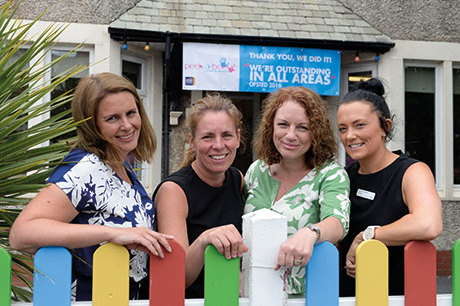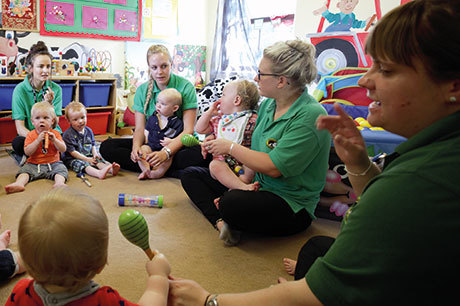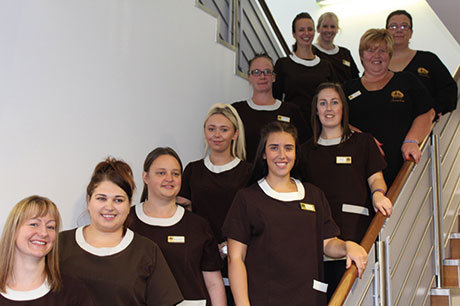
The growth of Little Forest Folk, a chain of outdoor nurseries, has been rapid. It opened in Wimbledon in January 2015 with three staff and now has 52 staff across five settings in south west London. ‘No wonder we feel like we’re recruiting constantly,’ says managing director Leanna Barrett, who remortgaged her home to open the first setting.
The swift up-scaling of the model was thanks to the organisation being awarded Social Entrepreneur of the Year by the Big Venture Challenge in 2016, which brought financial, legal and HR assistance.
The nurseries – based on the Scandinavian model of giving children the freedom to enjoy nature – are sited in accessible but not overused green spaces which are leased or have licence agreements. There is access to a building at the beginning and end of the day with children and practitioners spending from 9am until 3.30pm exploring outdoors, erecting rain shelters if needed and sleeping in tents.
Demand for the nurseries, which cater for 110 two- to five-year-olds, is so great that 1,900 families are on the waiting list. ‘We planned to open a sixth nursery in Surbiton but have postponed it until the spring because we felt it would put too much pressure on our senior leadership team,’ says Ms Barrett. ‘There is such high demand that we could open more but we are going to try and resist because we hope to also open a primary school and need the space to work on that. Parents are sad when their children leave because they enjoy the ethos and style of learning, so we’d like for them to be able to continue into school.’
The nursery group has also added more awards – joint winner for Health and Well-being at the Nursery World Awards 2017, highly commended in Nursery of the Year, and for the second year running won the Online and Social Media category.
POPPY AND JACK’S

The Lancashire group, which opened its first nursery in 2009, received development funding from investor Foresight to acquire three Stepping Stones nurseries in July. ‘Getting investment to expand was exciting as it meant we could go for something we really wanted and believed in rather than just something we could afford,’ says owner Sarah Bellamy. ‘We always want to acquire nurseries with the same child-initiated play ethos because it’s very hard if there is a different culture. Overhauling a nursery is unsettling for the staff, parents and children who have bought into that nursery’s ethos.’ She believes in working hard to build passion and pride in her practitioners and feels an important part of acquiring the right nurseries is gaining a solid staff team.
Ms Bellamy does not currently want to rebrand Stepping Stones nurseries because she wants to retain the ‘brilliant reputation’ that the previous owner built. The chain, which recently introduced Forest School across its eight nurseries, will now enter a period of consolidation to integrate systems and processes before looking to add a further three nurseries next year. Ms Bellamy envisages growing the chain to at least 15 settings.
‘As a qualified accountant who worked with blue chip companies, I’m privileged because I have a very strong CV when it comes to attracting investment,’ says Ms Bellamy. ‘I was fortunate to be recommended the right investor by a friend. It was great timing for both of us and I didn’t need to look into corporate finance.’
NATURAL CHOICE NURSERIES

Unhappy with their sons’ childcare, particularly the high staff turnover and poor-quality food, Nicky and Fred Edwards decided to open their own nursery in 2006. ‘We work hard to ensure our staff feel valued, rewarded and happy,’ says Mrs Edwards. ‘We feel strongly that if we recruit the right staff team and treat them with respect then they look after the children well. If the children are happy then so are the parents.’
She attributes their good staff retention to many aspects including highly competitive remuneration, paying discretionary sick pay and actively encouraging personal development and training.
The group doubled to four settings in April when it bought Desirable Childcare nurseries in Cheltenham. ‘From talking to other nursery chain owners, we realised that by expanding we could afford to invest in more centralised facilities such as administration, an early years advisor and marketing, which enables us to take a more strategic role and make all of the settings better,’ Mrs Edwards explains.
The new nurseries, which will be rebranded to Natural Choice – Cheltenham, are very different from their first two because they are leasehold and based in community buildings in areas of deprivation, but they are replicating the same ethos with home-cooked healthy food and empowering the staff. The newly formed management team of existing employees have been working with their new owners to identify resources that can improve the outcomes for the children. These improvements have already been recognised by a recent Ofsted inspection.
The chain’s growth has been supported by a Barclays local business manager, but Mrs Edwards says they will watch the sector carefully before expanding further. ‘It was risky buying the nurseries this year with the introduction of 30 hours funding. The sector is in crisis with many providers closing down. We are business owners with all the challenges and stress that brings, yet the Government treats us as a nationalised industry and dictates our prices,’ she says.
‘It will take time to see how the sector evolves, but the next few years with rising costs such as living wages, business rates and pensions and static funding will challenge us all. Parents are already realising the 30 hours do not cover nurseries’ costs and in many cases means families are worse off.’
HONEY POT DAY NURSERIES

PHOTO Joanna Rose Photography
The Liverpool-based chain was established in 2007 by Julie and Tony Hurst and opened its fifth nursery in September. The group prides itself on being family-run with daughters Jenna Geggie and Melissa Kalli both operations managers.
‘My children attend the nursery and we ensure that all children are treated the same as we’d treat our own,’ says Ms Geggie. ‘Parents always comment that our nurseries feel like home from home and that they are welcoming and friendly.’
The first nursery was an existing childcare business, but since then they have concentrated on renovations in order for the settings to be purpose-designed and for staff to go through a set recruitment processes.
‘We like to have a blank canvas so that we can design the nursery as we’d like, such as most rooms having direct access to the outdoors and preferring to have cosy rooms rather than noisy big playrooms,’ says Ms Geggie. ‘We move a small core team of staff to the new site so that we can model the Honey Pot way to new staff and guide and mentor them.’
The latest nursery, funded by Santander Business Banking, is the chain’s largest setting with 91 places and its biggest project to date. It is based in a former presbytery and social club and the site also houses a former church, which they are considering developing into out-of-school care following parents’ requests.
Any future expansion will continue to be within a maximum 30 minutes’ drive of Liverpool so that the family can remain hands-on. But Ms Geggie says next year will be quiet regarding developing the business as the managers concentrate on their growing family – she has recently had a second child, while her sister has given birth to twins.
PORTICO DAY NURSERIES

Portico is the Latin for ‘gateway’, the chain’s philosophy being that it is the gateway to children’s learning. Director Nicole Politis, who co-owns the group with her brother, Craig Jackson, says the unique child is at its heart. Their diverse portfolio of eight nurseries and three after-school clubs in Lancashire and Merseyside supports this, with nurseries ranging in size from 32 to 100 places and from purpose-built to conversions and children’s centre sites.
‘The nurseries all have their own distinct character and attract different people because of this,’ says Mrs Politis. ‘Some parents love settings that are homely and small whereas others love the spacious and modern feel of our new-builds.’
The chain concentrates on a catchment area within 20 minutes of its Ormskirk head office, which enables Mrs Politis and the area manager to visit each setting regularly, and practitioners can be utilised across the settings when needed rather than resorting to supply staff. The latest setting opened in a business park at the end of September and Mrs Politis reports that interest has been even greater than anticipated.
‘We have a strong brand which people believe in. We are known and trusted in the area, which brings people to us,’ she says. ‘Despite the current climate, I feel that we have a bright future. Parents will always need childcare and will come to us as long as we continue to meet their needs and employ the best staff.
‘We’re lucky as a chain to have office staff to support our nurseries with all the bureaucracy of Ofsted and 30 hours funding. Sadly, it is the single sites and playgroups that struggle.’









